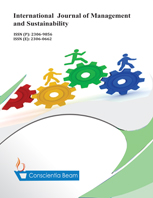Detrimental impact of employees' job demand on their workplace incivility behaviour: Restorative role of self-efficacy
DOI:
https://doi.org/10.18488/11.v13i1.3593Abstract
This study aimed to measure the impact of employees' job demands as a stressor on exhibiting their uncivil behavior at the workplace and the remedial role of self-efficacy for the detrimental effect of job demand on workplace incivility behavior. Research on employees' uncivil behavior in the workplace is crucial to understanding its causes, impacts, and potential interventions, enabling organizations to foster a respectful and productive work environment, enhance employee well-being, and optimize organizational performance. Employees of the Nepalese cooperative industry participated in a survey to gather empirical data. The perceptual cross-sectional data were analyzed using a positivist research methodology and deductive reasoning. Altogether, 495 responses were analyzed quantitatively using "Analysis of Moment Structure" (AMOS) software and graphically presented. The result revealed that employees' perceived job demand positively affected (B = 0.43, p < 0.001) their workplace incivility behavior. At the same time, self-efficacy had a negative impact (B = -0.32, p <0.001) on uncivil behavior at the workplace. In addition, self-efficacy moderated (B = -0.47, p <0.001) the connection between job demand and workplace incivility behavior. Job demands positively impacted incivility for employees with low self-efficacy, but the effect was insignificant for those with high self-efficacy. Moreover, employees with low perceived job demand exhibit higher workplace incivility behavior (WIB) when they have high self-efficacy compared to low self-efficacy. These findings have implications for addressing job demands and fostering self-efficacy to mitigate workplace incivility. Further avenues for research are discussed.

